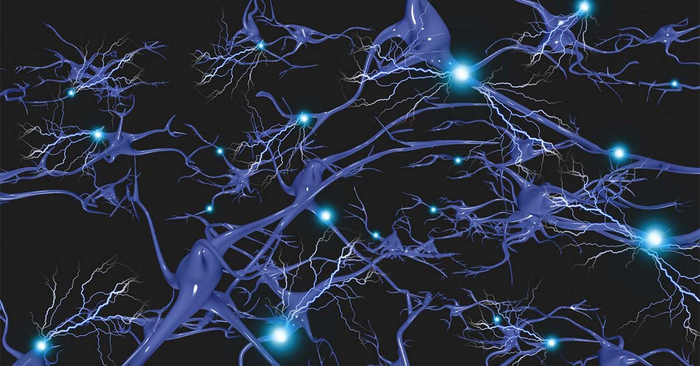Huntington’s disease (HD) is a neurological disorder that causes progressive loss of movement, coordination and cognitive function. It is caused by a mutation in a single gene called huntingtin or HTT. More than 200,000 people worldwide live with the genetic condition, approximately 30,000 in the United States. More than a quarter of a million Americans are at risk of inheriting HD from an affected parent. There is no cure.

Credit: Huntington’s Disease News.
Huntington’s disease (HD) is a neurological disorder that causes progressive loss of movement, coordination and cognitive function. It is caused by a mutation in a single gene called huntingtin or HTT. More than 200,000 people worldwide live with the genetic condition, approximately 30,000 in the United States. More than a quarter of a million Americans are at risk of inheriting HD from an affected parent. There is no cure.
But in a new study, published December 12, 2022 in Nature Neuroscience, researchers at University of California San Diego School of Medicine, with colleagues elsewhere, describe using RNA-targeting CRISPR/Cas13d technology to develop a new therapeutic strategy that specifically eliminates toxic RNA that causes HD.
CRISPR is known as a genome-editing tool that allows scientists to add, remove or alter genetic material at specific locations in the genome. It is based on a naturally occurring immune-defense system used by bacteria. However, current strategies run the risk of off-target edits at unintended sites that may cause permanent and inheritable chromosomal insertions or genome alterations. Because of this, significant efforts have focused on identifying CRISPR systems that target RNA directly without altering the genome.
In the case of HD, the condition is caused by repetitive and damaging sequences in the HTT gene.
Our cells have a hard time copying repetitive DNA, and these copying errors can cause repetitive sequences to grow longer with each generation,” said senior study author Gene Yeo, PhD, professor of cellular and molecular medicine at UC San Diego School of Medicine.
“In the Huntingtin gene, these repeats can sometimes grow to many times their normal length, with the resulting repeat-expanded protein tending to aggregate and form toxic clumps in a part of the brain called the striatum that is important for regulating movement. The loss of functional neurons in the striatum ultimately leads to HD symptoms.”
With colleagues at UC Irvine and Johns Hopkins University, Yeo and his team investigated whether recently described RNA-targeting CRISPR technology could be used to affect RNA (a chemical intermediate between DNA instructions and protein production) accumulation associated with HD.
They used viral vehicles to deliver the therapy to neuronal cultures, which were developed from stem cells derived from patients with HD, and found that the approach not only targeted and destroyed mutant RNA molecules, but also cleared out toxic protein buildup. They also demonstrated that expression of other human genes was generally not disrupted by the therapy.
“Our goal was to engineer a type of therapy that would only target the toxic RNA that causes HD and could keep the rest of the human genome and transcriptome intact,” said co-first author Kathryn Morelli, PhD, a research fellow in Yeo’s lab. “We specifically screened our top therapeutic constructs in HD patient cell lines to make sure of it.”
Development of effective therapies for HD has proven challenging. In 2021, for example, two clinical trials for promising gene therapies were halted following disappointing results performance. Both potential drugs had been touted as game-changers for HD. Currently, no treatments can alter the course of the disease, though medications can lessen some symptoms.
“The Huntington’s community was devastated when the clinical trials failed, primarily due to target specificity and toxic effects,” said Yeo. “But their termination has only re-energized the scientific community to find alternative strategies.”
Yeo’s lab collaborated with Wenzhen Duan, MD, PhD, professor of psychiatry and behavioral sciences, at Johns Hopkins Medicine to conduct preclinical testing in mice. Duan, with co-first author Qian Wu, PhD, found that the therapy improved motor coordination, attenuated striatal degradation and reduced toxic protein levels in a mouse model of HD. The improvements lasted for at least 8 months without adverse effects and minimal off-target effects on other RNA molecules.
Co-authors include: Maya L. Gosztyla, Ryan J. Marina, Kari Lee, Krysten L. Jones, Megan Huang and Allison Li, all at UC San Diego; Hongshuai Liu, Minmin Yao and Chuangchuang Zhang, Johns Hopkins University; Jiaxu Chen, Beijing University of Chinese Medicine; and Charlene Smith-Geater and Leslie M. Thompson, UC Irvine.
# # #
Journal
Nature Neuroscience
DOI
10.1038/s41593-022-01207-1
COI Statement
Gene Yeo is a scientific advisory board member of Jumpcode Genomics and a co-founder, member of the Board of Directors, scientific advisory board member, equity holder and paid consultant for Locanabio and Eclipse BioInnovations. He is also a Distinguished Visiting Professor at the National University of Singapore.




